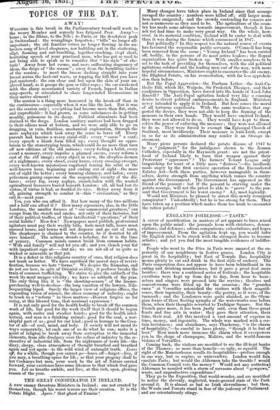TOPICS OF THE DAY.
AWAY!
WELCOME is this break in the Parliamentary tread-mill work to the weary Member and scarcely less fatigued Peer. Away !— home ; to the Rhine, to the Nile ; to Paris, or the desolatest peak in Switzerland : the wranglings forgotten ; " bills " no longer all- important; the old familiar voices no longer flowing in the un- broken song of level eloquence, nor bubbling out in the stuttering, clipt, foaming and out-tumbling, together-crashing, stopt short, hesitating speech of your practised man, who has got so used to not being able to speak as to consider that " his style" of rhe- toric ! Away from hot rooms, and more suffocating stagnancy of ideas, the dregs of "the season" ; away from the humbling tactics of the session ; to meet the breeze dashing straight intoyour breast across the keel-cut wave, or topping the hill that you have just mastered; the sun clear and hot upon the skin of your un- gloved hand, as it grasps the gun or tiller-ropes ; the ear awakened with the sharp accentuated variety of French, lapped in Italian song-speech, or stimulated to chase longwinded. Germanisms in their native element !
The session is a thing more honoured in the break-off than in the continuance—especially when it was like the last. But it was not the session only ; everything had become more than flat, stale, and unprofitable : it had grown, as some substances do in getting mouldy, poisonous in its decay. Political stimulants had been drained to the dregs. London sanitary matters had been dragged to their odious mud at bottom, and we were only able to go on dragging, in vain, fruitless, mechanical exploration, through the mere asphyxia which took away the sense to leave off. Every pursuit had become a weary stand-still; every " cause" a cant; every speech a blank form filled up ; every thought an oppro- brium to the stereotyping brain, which could do no more than turn off new editions of the old notions ; every feeling a habit, every event a memory, every impulse a planned encore, every reform a cast of the old image; every object in view, the sleepless daemon of a nightmare; every street, every house, every crossing-sweeper, every well-known mysterious vagabond tracing his orbit at the well-known hour, beginning and ending out of sight—the more out of sight the better ; every burning chimney, soot-laden ; every policeman gazing supreme on the responsible vacuity of the dis- tance ; every fog, every zephyr, stench-laden with the wasted agricultural treasures buried beneath London : all, all had lost its virtue, if virtue it had, or doubled its vice. Better away from it all, gaining strength to combat it—this " civilization," as they call it—next year. Yes, you who can afford it. But how many of the two millions and a half can afford it ? How many sojourners, also, in the little Londous, the smaller focuses of " our commercial greatness," can escape from the stench and smoke, not only of their factories, but of their political traffics, of their intellectual " questions," of their social habits ? How few ! Newspapers must publish, professional agitators must pay their weekly bills, fools must talk, hours must succeed hours, and towns will not disperse and go out of town. The shopkeeper is chained to the counter, be it deserted by all save himself. The artisan dreads a holyday, for it is the time of penury. Common minds cannot break from common habits. " Wife and family" will not let you off; and you clench your fist with impatient rage at—but no ; we are not all of us quite so wicked or miserable as that yet.
It is a defect in this religious country of ours, that religion does not teach us better. We have sacrificed the sacred days of revivi- fication, because we hate "forms." We despise the Ramadan, and do not see how, in spite of Oriental avidity, it perforce breaks the train of common trafficking. We strive to give the sabbath of the week its most meagre vitality ; we have no sabbath of the year. The only thing like it is " the shooting-season" of the licence- purchasing well-to-do class—the long vacation of the lawyer, Nile- frequenting biped. Surely the larger view of religious offices, the expanding vision of science, the sheer economy of industry, ought to teach us a "reform " in these matters—Heaven forgive us for using, at this blessed time, that sessional expression ! It is not only good for the health bodily to break off the common work of life, but good for the work itself that it should be begun again, with cooler and steadier bands; good for the health intel- lectual, and man is a thinking animal; good for the soul, a wor- shipful part of us ; good for our kind ; good in homage to the Crea- tor of all—of soul, mind, and body. If society will not mend its ways corporately, let each one of us do what he can; make it a point of religion to break away from corruption to the immortal elements, from idle drudgery over the refuse of industry to the re- storative of industrial life, from the nightmare of town life—the dizzy, sleepy, close atmosphere of thought breathed and breathed again and yet again—to the wild wind of untaught truth. Leave of, for a while, though you cannot go—leave off—forget—live, if you may, a breathing-space for life ; so that your progeny shall be not Cockneys but men, your work be the art of Nature carried forward, your existence have some likeness to that which God gave you. Let us breathe awhile, and live, at this rich, open, glowing season of the year.


























 Previous page
Previous page